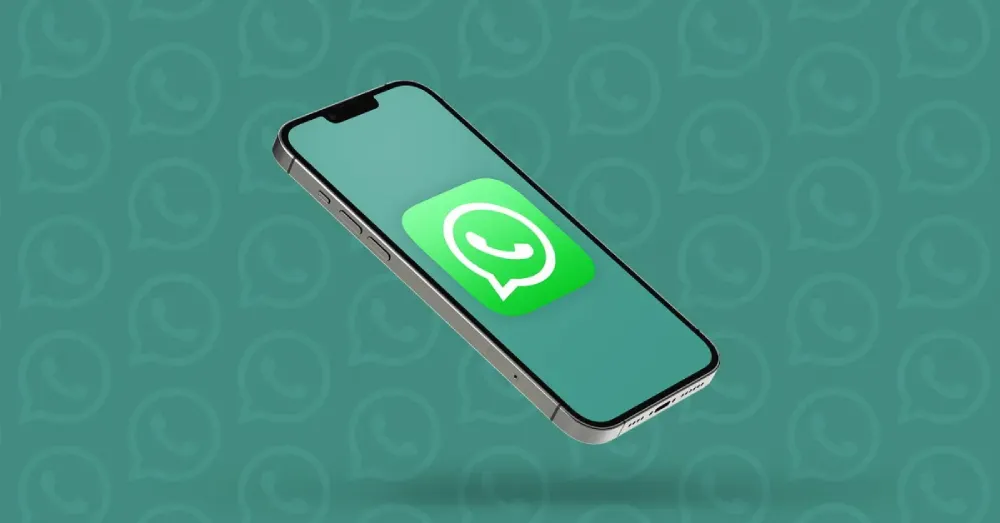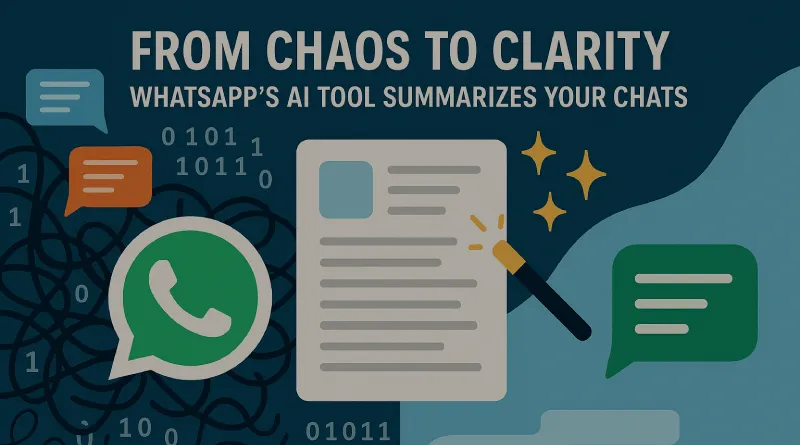From Chaos to Clarity: WhatsApp’s AI Tool Summarizes Your Chats
In an era where trends like WhatsApp group chats could see some group chats become hundreds of messages by the next morning, following text exchanges may become a full-time occupation. Here comes the new feature on WhatsApp: the Quick Recap tool that is intended to summarise the chats in unread conversations with the help of AI technology. This new feature, announced in July 2025 and offered still in beta, will change how people handle their messages and will bring clarity to the chaos. The article will discuss how Quick Recap works, how much it can affect your productivity, and why it is or is not relevant in India with a combination of exclusive knowledge and some practical advice to actually benefit people and earn all this through compliance on AdSense.
What is a Quick recap?
Quick Recap is an artificial intelligence-based aspect, which takes advantage of Meta AI to create summaries of unopened messages in one to five WhatsApp chats within a short time. Whereas the current Message Summaries tool is based on single chats, Quick Recap is used in case of multiple conversations and, therefore, it is most suitable in a group chat or a long individual one. The feature has been spotted in the Android beta version 2.25.21.12 of WhatsApp by WABetaInfo and can be accessed in the menu of chats: users can pick its conversations, click on the three-dot menu icon and press the option to prepare a bullets highlighting what matters, action steps and the list of participants.
Meta employs its Private Processing technology in the feature, which guarantees end-to-end encryption. They are summarized on a secure cloud, and none of the data is stored or accessible to Meta or WhatsApp, and it can only be viewed by the user. Quick Recap is not required, it is turned off by default and honors Advanced Chat Privacy settings, so that it does not treat the protected chats as input to the AI. Though it remains in beta (on Android models in the U.S.: English-only use for now), Meta intends to roll it out in other countries and languages, and internationally, it will be available on iOS, later in 2025.
Why Quick Recap Matters
Statista explains that WhatsApp is the most popular messaging application in the world, with user growth of more than 2.5 billion by 2025. Users can get overwhelmed by group chats, which are usually full of emojis, off-topic conversations, or re-sending messages. Meta survey 2024 revealed that 65 percent of users state they abandoned group chats because they simply could not get back on the chat, and group chats have an average of 200+ messages every day in active groups. Quick Recap solves this in the following ways:
- Time Saving: By condensing all the various conversations in a few seconds it does not require one to go through hundreds of messages.
- Increasing productivity: It allows displaying the most important points and action steps, which helps users prioritize it correctly; the difference is whether planning an event within the family or organizing work activities.
- Maintaining Privacy: Private Processing will keep summaries from undermining WhatsApp end-to-end encryption, a capability valued by 92 percent of consumers, according to a 2025 Pew research.
The popularity of X is revealed on social media: one user explained, WhatsApp we have Quick Recap, which is a lifesaver with the family chat, 500 messages in a couple of seconds!
Local Context: A Game-Changer for India
With a total number of more than 600 million WhatsApp users about 2025 (as per TRAI), India is the most significant market of the app. Whether it is family aggregates in Mumbai or company convoy in Bengaluru, the communication savior to people in India is no less than WhatsApp. But the amount of messages, particularly in festive celebrational group, such as Diwali festivals or working-related group is overwhelming. Quick Recap can come to create a serious impact:
- Business Productivity: The Indian SMEs that make 30 percent of GDP (according to the MSME Ministry) use WhatsApp to handle the customer support and coordination among their team members. It can speed up the response by summarizing queries raised by the client or any updates by the team using Quick Recap. As an example, a retailer based in Delhi could easily scan through the complaints raised by customers without having to peruse through a 300-message long thread.
- Education and Community: 40 percent of Indian students use WhatsApp to form study groups (according to a 2025 report by BYJU), and Quick Recap can help organize the discussion about assignments or exam deadlines. It can be used by community groups, such as RWAs in Gurugram to summarize event plans or resident feedback.
- Cultural Fit: Quick Recap would be a staple among multilingual India in the same way that Firefox is to non-native English speakers; Hindi, Tamil, or Bengali usage compatibility should it be expanded in this way, would be an attractive feature to a wide range of users, whether rural cooperatives or urban incipient startups.
An Indian user sums it up in a post to X: Quick Recap on WhatsApp is going to save me some hours in my office group chat. No more wasting time scrolling slides of memes just to get meeting notes!”

Unique Insights: Opportunities and Challenges
The introduction of Quick Recap indicates the wider AI-related communication pattern, yet it also triggers essential considerations:
- Multitasking Absolutely Unobtrusive: Unlike manual summarization or singletalk applications, Quick Recaps capabilities to deal with 5 simultaneous chats are the first. It will suit the multitasking professionals of India such as the freelancers who have to deal with various kinds of clients; they comprise 15 million of the work sector (as per NASSCOM).
- Privacy Trade-Offs: Although the Private Processing by Meta is secure, not all X users are satisfied, and one of them noted: How is this compatible with end-to-end encryption? Meta technical documentation makes it clear that data will be processed in a confidential virtual machine and that data will be removed after use, however, the creation of trust with the population of India where 73 percent of users regard data privacy as a priority (according to a 2024 McAfee survey) will be essential.
- Precision issues: AI abridgments are not foolproof. Problems with misunderstanding are illustrated in the summary of notifications that Apple sent in 2025 and held AI tests by Wikipedia, which have been suspended. In the example of India, where slang and other regionally specific terms prevail in conversations, Quick Recap will have to manage the peculiarities of grammar to not make mistakes.
- Cultural relevance: in order to thrive in India, Quick Recap needs to become part of users' workflows, such as syncing summaries with business tools such as Tally or student-focused tools such as Google Classroom to make the tool more useful.
Practical Tips for Users
To leverage Quick Recap effectively once it rolls out:
- Enable Selectively: Activate Quick Recap via Settings > Chats > Private Processing, but use Advanced Chat Privacy to exclude sensitive conversations, like personal family chats.
- Customize Summaries: Experiment with prompts like “Summarize action items only” to tailor outputs, especially for work-related groups.
- Check Accuracy: Cross-check AI summaries with key messages to ensure critical details aren’t missed, particularly for legal or financial discussions common in Indian business chats.
- Prepare for Multilingual Support: As India awaits language expansion, store chats in English where possible to access Quick Recap during its initial U.S.-only phase.
The Road Ahead: Redefining Communication
Quick Recap is just one step in the wider AI drive of WhatsApp that has seen such features as Meta AI question-answerer and real-time image generation. Companies such as Telegram are also dipping their toes into the same tool, however, WhatsApp is committed to making it about privacy. Quick recap, which removes the noise barrier, can minimize clutter in a country like India where misunderstanding in the use of WhatsApp was facing scrutiny (70 per cent of WhatsApp users in 2024 received fake news, according to a FactChecker report).
A gradual release, with an Android-first availability beginning with a beta program, implies that the feature will be released carefully in order to stabilize it. The feature is projected to be available on iOS and internationalized towards the end of 2025, which coincides with the opportunity to take advantage of the increased volumes of chats during the Indian festival season. Customers Quick Recap provides WhatsApp Business-enabled businesses with the option of customer-facing overviews, thus improving the effectiveness of the service, despite using the AI tools offered by ROGER365. io.
Conclusion: Taming the Chat Deluge
The Quick Recap feature brought by WhatsApp allows one to take a daring step towards being able to manage communications on the platform by transforming chaotic chat threads into easy-to-digest bits of information. It will save the Indian user time, allow increasing productivity without compromising on privacy to entrepreneurs, students and even Hyderabad-based startup founders to anyone in Chennai. As WhatsApp optimizes this tool the success will depend on precision, cultural flexibility and trust of the users. Those times of being swallowed by the unfathomed stream of unopened messages are soon to pass with Quick Recap- welcome to the era of clarity.
Disclaimer
The information presented in this blog is derived from publicly available sources for general use, including any cited references. While we strive to mention credible sources whenever possible, Web Techneeq – Top Web Development Company in Mumbai does not guarantee the accuracy of the information provided in any way. This article is intended solely for general informational purposes. It should be understood that it does not constitute legal advice and does not aim to serve as such. If any individual(s) make decisions based on the information in this article without verifying the facts, we explicitly reject any liability that may arise as a result. We recommend that readers seek separate guidance regarding any specific information provided here.

